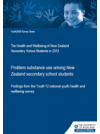This report explores the health issues and contexts of New Zealand secondary school students who use substances at very high levels. Young people who use substances more than their peers are likely to have high rates of absenteeism from school and may be early school leavers.
The Ministry of Health aims to support recovery and wellness and minimise the harm that addiction can cause. To support this, they asked the Adolescent Health Research Group (AHRG) of the University of Auckland to provide data about secondary school students using substances in ways that are likely to be problematic. The Ministry suggested that this population be defined using variables relating to alcohol, marijuana, other substances use and binge drinking.
This report is based on Youth’12: The national health and wellbeing survey of 8500 New Zealand secondary school students.
It provides evidence and awareness of the problems that are connected to substance use and highlights the fact that New Zealand adolescents appear to be using less alcohol, less marijuana and fewer other substances than they were in recent years.
However, substance use remains a significant problem for a minority of students and it causes substantial personal, social and economic harm. The report finds that approximately 11 percent of New Zealand high school students use substances at levels that are likely to cause them significant current harm and may cause long-term problems.
Those with substance use problems are likely to have higher rates of mental health problems, unwanted sexual contact, unsafe sex, exposure to violence, cigarette smoking, risky driving experiences, less likely to ‘like school’ and other harms.
This report enables youth addiction treatment services to develop their scope of practice to incorporate these wider problems, and assist funders and planners, frontline youth service managers and youth workers to deliver relevant services.

